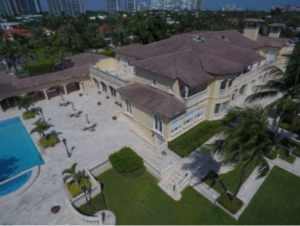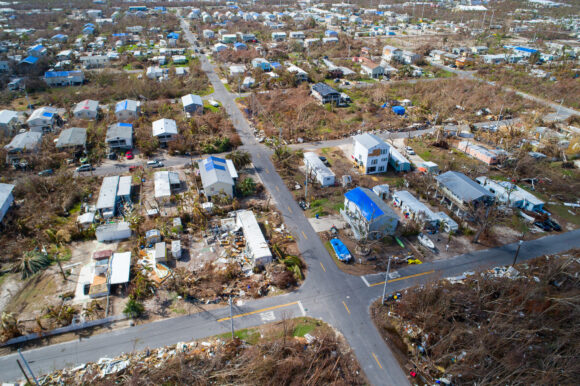Two south Florida lawsuits against property insurers argue that two major carriers employed a business strategy of hiring inexperienced or even unlicensed claims adjusters after storms, practices that have led to “lowball” damage estimates that fall below deductibles.
In one of the suits, brought by a Miami condominium association, the plaintiffs produced records they said showed that after Hurricane Irma, almost 4,800 claims for Heritage Property & Casualty Insurance Co. were handled by unlicensed adjusters. Of almost 35,000 Heritage claims after Irma and Hurricane Michael, in 2017 and 2018, some 14% were handled by unlicensed adjusters, potentially in violation of state laws and regulations, according to the lawsuit filings.
The Samari Lakes East Condo Association vs. Heritage suit resulted in an $18 million judgment against Heritage in 2023. A subsequent bad-faith suit was settled in March of this year for an undisclosed amount.
An Insurance Journal spot check of dozens of the adjusters’ names listed in the lawsuit shows that many of those were not licensed in Florida or other states at the time of the property inspection. Several have since been licensed in Florida or other states.
Heritage insurance officials and plaintiffs lawyers in the case did not respond to requests for comment about the assertions. But in court pleadings Heritage said it had relied on independent adjusting firms to provide licensed inspectors and “has since changed its practice to add its own internal vetting and review process to ensure that independent adjusters assigned to Heritage’s claims are properly licensed in Florida.”
The complaint suggests that several third-party claims management firms were hired after Irma, but Heritage also sent its own workers, many of whom were not licensed.
In a separate lawsuit, attorneys for the owners of a $95 million mansion near Miami Beach recently alleged that American Home Assurance, part of AIG, American International Group, also made a habit of employing inexperienced and “unqualified” claims investigators. Many of those were overloaded with work and were unable to fully investigate wind and water damage, contends the complaint in Michael Newman vs. American Home Assurance.

“This is a classic AIG business model; offer to pay a little now supported by skimpy estimates, in the hope that it will either never have to pay a fair amount or that payment will be delayed for so long that the ‘float’ will offset the amount of the fair payment,” the suit reads.
American Home and AIG officials declined to comment on whether the companies have utilized unlicensed or inexperienced adjusters. In court documents, though, the companies’ attorneys denied that the insurer had followed a “lowball” business practice.
A Miami jury in the Newman case last week found that the insurer had not engaged in bad faith actions, but had violated the state’s Unfair Claim Settlement Practices Act. The jury awarded only interest on the cost of alternative living expenses for the Newman family, who were displaced by the damage after Hurricane Irma. The judge in the case has yet to determine the dollar amount but it is not expected to be much more than $1 million.
Independent adjusters who have worked claims in Florida said the allegations in the lawsuits are not surprising. Insurance carriers have often utilized first-time or young adjusters, ones that may be easily influenced to keep estimates low, or who may be unfamiliar with how seemingly minor damage can lead to major failures later on, said Ben Mandell. Mandell is a veteran independent adjuster who has worked for a number of Florida insurers and is one of several independent adjusters who have charged that some carriers have inappropriately altered their inspection reports.
In the Samari Lakes case, the condo association filed a claim after Hurricane Irma for extensive damage to multiple buildings. An unlicensed adjuster inspected and produced an estimate of $18,000 – just below the policy’s deductible, the lawsuit said. The Florida Department of Financial Services shows that the adjuster was not licensed in Florida until 2022.
The Florida Association of Public Insurance Adjusters contends that using unvetted claims investigators is a serious concern and can create problems for property owners.
“Adjusting insurance claims in Florida without a license violates the trust of policyholders during a time in which they are vulnerable and most in need of professional advice,” FAPIA President John Hornbuckle said in a statement.
In some cases, particularly after catastrophic storms, insurers have so many claims that they bring in adjusters from other states, he explained.
“At times, this includes people who are not licensed in Florida and are unfamiliar with the rules and regulations specific to our state.”
The association leadership said the practice of unlicensed adjusters in Florida “happens more often than it should.”
License requirements for adjusters varies by state. Some Southeast states, including South Carolina, allow out-of-state adjusters on a temporary basis after a storm event, but they must be able to show proof that they are licensed in other states.
Florida regulations allow out-of-state adjusters during an emergency, such as after a hurricane. But those adjusters must first apply to the state Department of Financial Services. And only Florida-licensed insurance companies and independent adjusting firms can submit those applications. Public adjusters need not apply, the department rules note.
Florida statutes generally forbid unlicensed claims adjusting: “Any person who knowingly transacts insurance or otherwise engages in insurance activities in this state without a license in violation of this section commits a felony of the third degree,” one statute reads.
Ironically, it has often been Florida insurers and industry advocates who have complained vehemently about unlicensed adjusters or contractors acting as adjusters through the years, convincing some homeowners to assign benefits, which have led to exaggerated repair costs.
Florida lawmakers in 2023 responded and approved House Bill 1185, which beefed up requirements for adjusters and requires adjusters to keep their licenses with them, available for inspection, while working claims.
Senate Bill 7052, the Insurer Accountability Act, also signed in 2023, underscores the requirement that insurance carriers must assign licensed and appointed adjusters to examine a property when a claim is made.
Top photo: Aftermath of Hurricane Irma in the Florida Keys.
Was this article valuable?
Here are more articles you may enjoy.


 Navigators Can’t Parse ‘Additional Insured’ Policy Wording in Georgia Explosion Case
Navigators Can’t Parse ‘Additional Insured’ Policy Wording in Georgia Explosion Case  UBS Top Executives to Appear at Senate Hearing on Credit Suisse Nazi Accounts
UBS Top Executives to Appear at Senate Hearing on Credit Suisse Nazi Accounts  Portugal Rolls Out $2.9 Billion Aid as Deadly Flooding Spreads
Portugal Rolls Out $2.9 Billion Aid as Deadly Flooding Spreads  Founder of Auto Parts Maker Charged With Fraud That Wiped Out Billions
Founder of Auto Parts Maker Charged With Fraud That Wiped Out Billions 